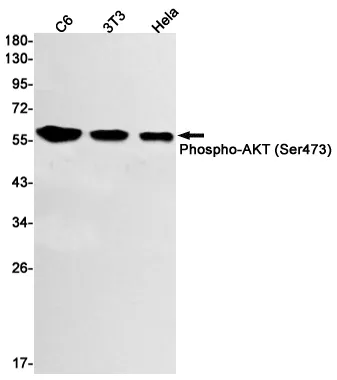
Size:100μL Price:300 $180
Application:WB
Reactivity:Human,Mouse,Rat
Conjugate:Unconjugated
Optional conjugates: Biotin, FITC (free of charge). See other 26 conjugates.
Gene Name:AKT1
Summary
| Production Name | Phospho-AKT (Ser473) Rabbit Monoclonal Antibody |
| Description | Recombinant rabbit monoclonal antibody |
| Host | Rabbit |
| Application | WB |
| Reactivity | Human,Mouse,Rat |
Performance
| Conjugation | Unconjugated |
| Modification | Phosphorylated |
| Isotype | IgG |
| Clonality | Monoclonal |
| Form | Liquid |
| Storage | Store at 4°C short term. Aliquot and store at -20°C long term. Avoid freeze/thaw cycles. |
| Buffer | 50mM Tris-Glycine(pH 7.4), 0.15M NaCl, 40% Glycerol, 0.01% Sodium azide and 0.05% protective protein |
| Purification | Affinity Purification |
Immunogen
| Gene Name | AKT1 |
| Alternative Names | AKT1; PKB; RAC; RAC-alpha serine/threonine-protein kinase; Protein kinase B; PKB; Protein kinase B alpha; PKB alpha; Proto-oncogene c-Akt; RAC-PK-alpha |
| Gene ID | 207 |
| SwissProt ID | P31749 |
Application
| Dilution Ratio | WB 1:500-1:1000 |
| Molecular Weight | Calculated MW: 56 kDa; Observed MW: 56 kDa |
Background
Akt, also referred to as PKB or Rac, plays a critical role in controlling survival and apoptosis. This protein kinase is activated by insulin and various growth and survival factors to function in a wortmannin-sensitive pathway involving PI3 kinase. Akt is activated by phospholipid binding and activation loop phosphorylation at Thr308 by PDK1 and by phosphorylation within the carboxy terminus at Ser473.
Research Area
Neuroscience
